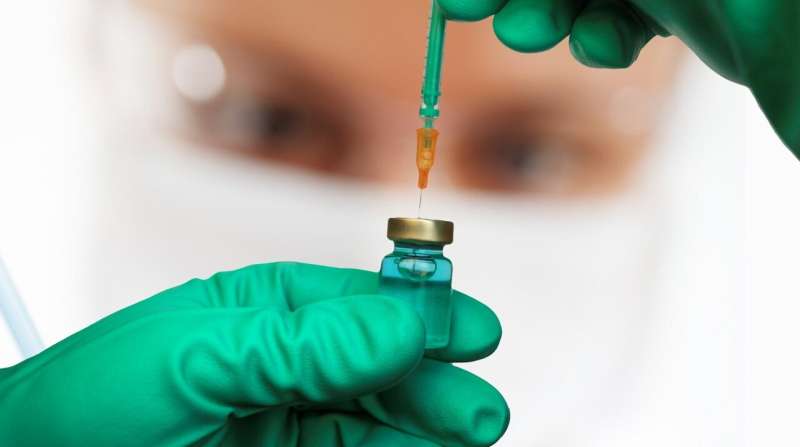This article has been reviewed according to Science X's editorial process and policies. Editors have highlighted the following attributes while ensuring the content's credibility:
fact-checked
peer-reviewed publication
trusted source
proofread
BCG vaccine does not protect against COVID-19 in health care workers, finds clinical trial

A world-leading international trial into the immune boosting benefits of the tuberculosis vaccine, BCG, has found it does not protect health care workers against COVID-19.
The BRACE trial, led by Murdoch Children's Research Institute, to test whether the BCG vaccine could protect health care workers against SARS-CoV-2 in the first six months after vaccination found it did not reduce the risk of developing COVID-19 among those on the pandemic frontline.
BCG was originally developed to prevent tuberculosis and is still given to more than 130 million babies worldwide each year for that purpose.
The BRACE trial was built on previous research that showed BCG also boosted "front-line" immunity in infants and protected against respiratory infections in adolescents and adults. It was hoped the vaccine could be repurposed to buy crucial time in a pandemic like COVID-19 until disease-specific vaccines were developed and tested.
The research, published in the New England Journal of Medicine and based on the second stage of the BRACE randomized controlled trial, involved 3,988 of the almost 7,000 health care workers who signed up across 36 sites in Australia, the Netherlands, U.K., Spain and Brazil. UMC Utrecht in the Netherlands, University of Exeter in the U.K. and the Oswaldo Cruz Foundation in Brazil helped to oversee the international arms of the trial.
The risk of symptomatic COVID-19 was 14.7% in the BCG group and 12.3% in the placebo group during the first six months after joining the trial. The research could not determine whether the vaccine reduced hospitalizations or death due to the low numbers of participants with severe COVID-19.
Murdoch Children's and the University of Melbourne Professor Nigel Curtis, Chief Principal Investigator of BRACE, said symptomatic COVID-19 being observed slightly more frequently in the BCG group might be explained by stronger immune responses induced by the vaccine.
"When we analyzed the immune cells from our health care workers, we saw that the BCG vaccine altered the immune response to COVID-19," he said.
"Symptoms reflect the immune system working hard to fight the virus. A stronger response induced by BCG could be beneficial in killing the virus more rapidly and protecting against progression to more severe disease. There was some evidence of this in trial participants over the age of 60, in whom COVID-19 symptoms were shorter in the BCG-vaccinated group."
Professor Curtis said because COVID-19 vaccines had been developed and rolled out at lightning speed and health care workers prioritized, fewer participants were recruited than originally envisioned. As a result, lower case numbers meant the team was unable to investigate whether BCG protected against hospitalization and death from COVID-19, he said.
A Murdoch Children's led study, published in Clinical & Translational Immunology last year using blood samples from BRACE participants, also showed that the BCG vaccine did provide an immune response consistent with protection against severe COVID-19.
University of Exeter Professor John Campbell, who led the U.K. arm of BRACE, said the trial represented an important opportunity to test the potential of the BCG vaccine.
"The findings raise important questions about how BCG can modify the course of different viral illnesses and allows us to develop a fuller understanding of whether the vaccine can provide protection against a range of infections other than its main target, tuberculosis," he said.
Oswaldo Cruz Foundation's Dr. Julio Croda said the majority of COVID-19 symptomatic cases were recorded in the Brazil trial arm.
"This demonstrates the high burden of the disease in Brazil during the entire pandemic," he said. Although BCG does not protect against symptomatic COVID-19, we will also use the data to assess whether BCG protects health care workers for latent tuberculosis infection. An open question, especially for populations at high risk of acquiring the disease."
Professor Curtis said trials of this size and complexity normally took about eight to 12 months to organize and recruit, but BRACE was able to start within three weeks due to the dedicated researchers and support teams at the Murdoch Children's, together with generous philanthropic support.
"This trial highlights the importance of large-scale randomized controlled trials to test hypotheses and evaluate the effectiveness of new or repurposed drugs or vaccines," he said. The importance of this was highlighted early in the pandemic by the Director General of the World Health Organization Tedros Ghebreyesus who stressed the need for the BCG vaccine to be given only in the context of clinical trials."
Professor Curtis said trial data analysis was ongoing with further results on the effect of BCG expected later this year, including the impact of the vaccine on other infections, such as respiratory illnesses and the effect on COVID-19 vaccine responses. The trial team is also using blood samples collected from participants to discover biomarkers for COVID-19 risk.
More information: Randomized Trial of BCG Vaccine to Protect against Covid-19 in Health Care Workers, New England Journal of Medicine (2023). DOI: 10.1056/NEJMoa2212616




















